- Home
- Jaleigh Johnson
Spider and Stone Page 13
Spider and Stone Read online
Page 13
Icelin didn’t know what to say. The cold specter of the invasion hung over even the golden-lighted forge. She wanted to help, but again she felt like she was only one small pawn in a greater game, a conflict as ancient as the dwarf race. But small steps could be taken, even by an outsider like her.
“You said you wanted me to look at those rings you took off the drow?” Icelin asked. “May I see them now?”
“Of course.” Ingara led them to the forge fire and took out the rings. She laid them in a semicircle on the anvil. “My father’s right. I don’t like keeping dark magic here, but I hate to melt them down without knowing what they do. Next time we face the drow, maybe we can turn their magic against them.”
Icelin held her outstretched hand above the rings and murmured the words of a spell. She felt the focused energies pass through her body, channeled and steadied by her staff.
Whispers folded around the arcane words, coaxing out any magic that might be hiding in the depths of the rings. At once, Icelin felt an answering call, a magical thread that wound around her fingers like icy needles. The sensation unsettled her. She’d never felt Art that was this cold and unwelcoming before. She supposed she shouldn’t have been surprised, but still, she was glad to lower her hand and sever the connection between herself and the rings.
“The rings hold magic,” Icelin said. “It isn’t strong, and I sense it’s not inherently destructive in nature.” Carefully, she picked up one of the rings from the anvil and slipped it on her middle finger. She dismissed the chill that passed through her body as nerves. “Did you hear any of the drow using command words to activate the rings?” she asked Ingara.
The dwarf woman nodded. “Are you going to try to activate that one?”
“Can you control it?” Ruen asked.
“Yes, but I’ll only test them if you want me to, Ingara,” Icelin said. “This is your home, your private sanctuary. I won’t bring forth hated magic if it will hurt you.”
Ingara touched the anvil and then touched her chest, as if following an invisible thread between them. “My thanks for that,” she said. “You understand better than most outsiders. I want you to test them. Nothing is sacred while the drow stand at our doorstep.”
“Stand back, then,” Icelin said, “to be safe.”
Ingara and Ruen gave her space, and Icelin stood with her back to the forge. “The command word is arachendrek,” Ingara said, the syllables scraping from her throat.
Icelin held up her hand, repeated the word, and waited.
Spiders poured from the dark corners of the forge.
They were small, scurrying brown spots at first. Then, as the magic pulsed more quickly from the ring, they grew larger, their hairy bodies and bottomless black eyes shining in the forge light as they formed a circle around Icelin.
“It’s all right,” she said, speaking more to reassure herself than Ingara and Ruen. “They aren’t attacking. They obey the wearer of the ring.”
“Icelin,” Ruen said in a strained voice. “Banish them—quickly!”
A sharp cry ripped Icelin’s attention away from the dozens of spiders now gathered at her feet. Across the room, Ingara clutched Ruen’s arm with both hands. The dwarf woman was obviously strong. Ruen winced in pain, but he did not try to break Ingara’s grip. Her face was white and frozen in a wretched, terrified mask. She stared at the spiders, unable to look away.
More came.
Glossy-bodied arachnids as tall as Ingara’s stone table crawled from the shadows on graceful black legs. There must have been hundreds of the smaller ones now, swarming over the tables, the anvil, forming a living carpet on the cloth covering Ingara’s axe.
Seeing that, the dwarf woman broke. Screaming, she dropped to her knees, covering her eyes with her hands. Sobs wracked her body. “Moradin’s mercy, make it stop!” she cried. She scratched at her skin and yanked her braids, tearing loose strands and making wild tangles around her face. “It’s everywhere! I can’t get it off!”
Icelin tore the ring off her finger, scooped up the others from the anvil and hurled them all into the forge. The fire surged hungrily, consuming magic and metal at once. Icelin turned away from the heat, though the sweat that poured down her face had little to do with the fire.
At her feet, the smallest spiders turned and scurried away from the heat and light, retreating to their dark corners. The larger ones simply vanished.
Icelin leaned unsteadily against the stone table. “Illusions,” she said. “Forgive me—I should have seen it at once. “The ring’s magic attracts smaller spiders and uses their forms to create illusions of much larger ones. Seeing a massive swarm like that coming at you in a battle would be enough to shake the morale of even the toughest soldiers. The drow are using that fear to gain an advantage against Iltkazar.”
“Icelin,” Ruen said quietly.
Icelin pushed off the table. Ingara crouched on the floor, her face in her hands. She trembled violently. Icelin went over and knelt beside her. When she touched Ingara’s shoulder, the dwarf woman flinched away and pulled into herself even more, as if she could disappear.
“It’s all right,” Icelin said soothingly. “They’re gone. They’re all gone.”
“What’s going on here?” a gruff voice rang out from the doorway.
Icelin looked up to see a thick-chested dwarf enter the forge. He had pale blond hair and beard, almost white, which contrasted oddly with his darker skin and eyes. When he crossed the room, Icelin noticed he walked with a slight limp, barely noticeable had he not been moving so quickly.
He crouched in front of Ingara. Ruen stood to make room. “Taerin,” the dwarf whispered, gently prying Ingara’s hands from her face. “Ingara, taerin, gordok en vin.”
Ingara looked at the blond dwarf with wide, red-rimmed eyes and shook her head furiously from side to side. She reached up to claw at her hair again, but the man caged her hands between his own and whispered soothing sounds that rolled out like low, distant thunder.
Breaths went by, but Icelin dared not move. Every movement made Ingara flinch and whimper, as if she expected the host of spiders to descend on them again in an instant. Icelin’s knees were cramped and cold from being so long on the floor, but she ignored the pains.
Meanwhile, the blond dwarf was slowly getting through to Ingara. He whispered softly to her in Dwarvish, and Ingara answered—intimate words not meant for outsiders to hear. Icelin felt a flush of shame, but still she dared not move for fear of breaking the calm, protective circle that she, Ruen, and the blonde dwarf had formed around Ingara.
At last, the dwarf kissed both Ingara’s hands and leaned close to brush away the tears that lingered at the corners of her eyes. They rose to their feet together and the man pulled her close, stroking his fingers through her wild hair. When they broke apart, Ingara was smiling tremulously.
“You must be Arngam,” Ruen said, holding out a hand to the blonde dwarf. The dwarf nodded coolly to him but did not free his hands from Ingara’s waist to clasp Ruen’s forearm.
“Well, I’d hope so,” Icelin said, smiling at Ingara. Her expression faltered. “Forgive me,” she said again. “I had no idea.”
“It’s not your fault,” Ingara said. “Don’t look at them that way, Arn.” She stepped from Arngam’s embrace and smoothed her hair. “It was my own stupidity,” she said. “Godsdamned drow worship spiders. I should have been expecting something like that. Tell the patrols the next time they’re overrun by spider attacks that they’re probably illusions,” she said to Arngam. “That’s what the rings we’ve been finding on all the drow corpses do. They’re trying to break us with the fear of seeing so many of the bastards at once.”
“I see. I’ll inform the patrols and the master armswoman at once,” said Arngam. The chill had left his voice, and he nodded at Icelin. “This is valuable information. You have our thanks.”
“You have my congratulations,” Icelin said tentatively, “on your upcoming wedding. I’m certain you’ll be very happ
y together.”
At the mention of the wedding, Ingara whirled on Arngam and jabbed an accusing finger at his chest. “What are you doing here, anyway?” she cried. “You know you’re not to set foot over this threshold before the wedding. You’d better be on a mission from Moradin himself, if you don’t want a beating.”
Arngam smiled fondly at his betrothed. “There’s my lovely one in all her fury. I heard you cry out. How could I not come to your aid?”
“And get a peek at your wedding-day gift,” Ingara said. “Don’t think I don’t know what’s really in your head.”
Arngam raised his hands in surrender. “Don’t worry, taerin, I haven’t seen a thing. I’ll leave you now—as long as you’re all right,” he added, sobering.
“I’m fine,” Ingara said. She leaned in and kissed her love on the cheek. “Go, and remember to tell the patrols.”
He nodded and left the forge. When they were alone, Ingara turned to the table and laid her hands over the cloth covering the axe. “Were they truly illusions?” she asked, not meeting Icelin’s eyes. “They did not taint this?”
“Illusions and common spiders,” Icelin said. “On a drow’s hand, the ring might have called out to more monstrous creatures of the Underdark to mix with the illusions. On my hand, no touch of the dark goddess’s magic reached those spiders. I’d have felt it.”
Ingara closed her eyes briefly and nodded. “Thank you.”
“Do you want us to leave you alone?” Ruen asked.
“No, I’m all right.” Ingara uncovered the axe and lifted it in her hands, as if to feel the reassuring weight, the reality of the weapon. “I started dreaming this design the night they brought Arngam and me to the city on our backs and out of our heads with fever,” she said. Her eyes clouded with the memory. “We were in the mines, inspecting the structure of one of the dead-end tunnels to see if we could dig through it and join it to the main passages. Giant spiders set upon us. We must have disturbed a nest—no one had been in that tunnel for months. The worst part was that I didn’t see the attack coming.”
Ingara shivered and touched her hair. “I felt one of them land on my back. The hair on its belly was soft, like warm fur. It wound into my hair and brushed against my neck—and then it bit me. I thought someone had put a fire in my veins.”
Icelin remembered the spider that had dropped on her from the cavern ceiling on their journey to the city. Pinned beneath its legs, she hadn’t had time to think about the horror of becoming the monster’s prey. She’d been too busy trying to escape.
But she would always remember those eyes staring at her, the black, soulless orbs that looked on her as food and nothing more.
“How did you escape?” Ruen asked.
“I didn’t,” Ingara said. “Arngam fought off as many as he could, while I writhed on the floor with cramps in my stomach like nothing I’d ever felt before. It was as if someone had taken hold of my insides and just kept twisting, twisting. Got so bad I could barely draw a breath. We’d have both died, but I screamed at Arngam to get away and bring back help. It was the only way. The spiders had enough time to work on me while he was gone.”
“You were awake for it?” Icelin said, horrified. “Merciful gods, had I been in your place, I would have gone mad.”
“Not quite,” Ingara said, lips twisting in a bitter smile. “A spider’s web, from the inside, smells like decay and something sharp and sweet that invades the lungs and makes a person lightheaded. Sometimes I still smell it, that scent—Arngam says I wash my hair more than any dwarf he’s ever seen, but he’s gentle with his teasing because he knows I’ll never really get all the smell out.
It’s too much in my head.”
“He’s a good man,” Ruen said. “He saved you from the spiders?”
“Aye, he brought a group back to rescue me, but it was still a nightmare of a fight.” Ingara put the axe down and began absently cleaning her tools and arranging them near the forge. The familiar rituals seemed to comfort her. “I hated him too, while I was in that web. Out of my head with pain and fever, I cursed Arngam horribly for leaving me, even though I was the one who told him to do it. I pray to the gods he never heard any of the things I said.”
“Even if he did, he knows you weren’t yourself,” Ruen said. “Pain and fear change a person. It’s no shame to you.”
“You sound like my sister.” Ingara smiled, chasing some of the shadows from her face. “Joya is always eager to forgive anybody any offense, bless her. In the end, Arngam got his share of poison too, ripping me out of that web, and the clerics spent days nursing us out of the fever. While I was lying in the grip of it, I started making the axe in my mind. If Arngam was able to forgive me for all that had happened, I knew we’d be good for each other. I took away my share of scars from that web, but some good came of it, too.”
She stared into the forge fire. “My thanks for your aid and for destroying the rings. I know you’ve not felt welcome, but we’re grateful you’re here. We need friends now more than ever. Father knows this. Obrin, for all his stubbornness, knows it too.”
“I don’t know how much help we’ll be able to provide,” Ruen said, echoing Icelin’s earlier thoughts. “We are only three people—two, and a cook,” he amended.
“The king disagrees,” Ingara said. “Joya’s told me a little of it, but King Mith Barak keeps his own counsel—and his own secrets—on some matters. He thinks you’re important.”
Why does that give me no comfort? Icelin didn’t voice the thought. “Speaking of the king, we should be going,” she said. “Ingara, are you sure you’re all right?”
“Once I begin my forge work, there’ll be no other thought in my head,” Ingara assured her. “Any more of those rings come my way they’ll go in the fire.”
The best place for them, Icelin thought. She wished Ingara could cast off her memories so easily.
“You’re quiet,” Ruen said as they made their way across the plaza to the king’s private chambers.
It must have been market day, for a handful of merchants had set up stalls in the plaza, and there were more dwarves about than Icelin had yet seen, though not nearly as many as there should have been on such an occasion. A handful of families milled about, buying supplies, but there was a subdued quality to their movements. Most spoke in low voices instead of the loud, boisterous shouts and curses Icelin expected from a busy marketplace.
“I thought you’d be pleased at the uncommon silence,” Icelin said. “I finally give you a moment’s peace, and you demand that I talk. Have you lost your wits, Morleth?”
“Not at all. It’s just that when you’re silent, I worry you’re plotting something,” Ruen said. “Since you’ll inevitably drag me into whatever scheme you’ve got brewing in your head, I thought it best to find out how great the danger is up front. I dislike surprises.”
“Poor Ruen, you’ve picked the wrong traveling companion,” Icelin said, laughing, but her humor couldn’t last, not under the weight of what she’d just witnessed. “I like the Blackhorns,” she said. “I’m afraid of what will happen to them … and us.”
“So am I.”
“I want the Arcane Script Sphere,” Icelin said, “but the price is high, and the battle the dwarves are facing is unimaginable. I wish …”
“You want to help them,” Ruen said. “I understand, but if the odds are as bad as Joya says, it’s likely Iltkazar is doomed no matter what aid we give the dwarves.”
“I can’t stand to see them lose everything,” Icelin said. Waterdeep was a long way away, but it still felt like her true home. If it were wiped off the face of Faerûn, she would be heartbroken. It would be as if her great uncle had died all over again. “What if it was your village that were threatened, the place where you were born?” she said. “You’d return and defend it, wouldn’t you?”
“For all I know, it may be gone,” Ruen said. “I haven’t been home in almost twenty years.”
“That long?” Icelin slowed and stopped i
n the middle of the plaza. Ruen turned to look back at her. “Why didn’t you say so when we began our journey? We could have our route take us there, we—”
“It’s a waste of time,” Ruen said firmly. “I have no family left there. My mother is dead, and my father was gone long before her.”
“Surely you must have had friends,” Icelin said.
Ruen scowled at her. “You remember the vision you saw of that place. You know how they felt about me and my ‘gift.’ ”
Icelin did remember. With perfect clarity, she recalled the night they’d spent in the belly of a rotting, haunted ship in Mistshore, where a ghostly troupe of spirits had pulled the childhood memories from Ruen’s mind and performed them before Icelin and her friends. Had she not possessed a perfect memory, Icelin thought that by now that night might have taken on the qualities of a dream.
No, she remembered the little boy whose own mother had been afraid to touch him for fear of his strange power to predict death. The true mystery, to Icelin at least, was that no one in the village had had the courage to look past such a curse to see the frightened, lonely child laboring under it.
“I can see why you wouldn’t want to go back,” she ventured. “I know what it’s like to be among people who don’t understand you and who fear you because of it.”
Would he let her reach out to him? Surely, at this moment …
Tentatively, Icelin laid her hand on his arm. She felt a tremor of hesitation go through Ruen’s body before he pulled away. Icelin wasn’t truly surprised, but that didn’t stop the sadness that squeezed her chest.
“Is that the way it’s always going to be?” she said softly.
“We’re here,” Ruen said, not answering.
Silence fell between them. Icelin noticed more guards than she’d seen yesterday clustered around the entrance to the king’s hall. They parted when Icelin approached, and one of the guards led her inside to a smaller hallway than the one that led to the king’s audience chamber. At the end of the hall was a pair of doors. As they approached, the right hand door opened, and King Mith Barak himself stepped through to greet them.

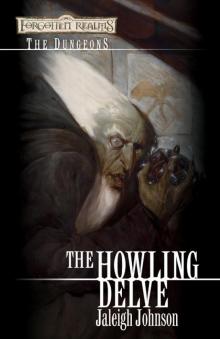 Howling Delve
Howling Delve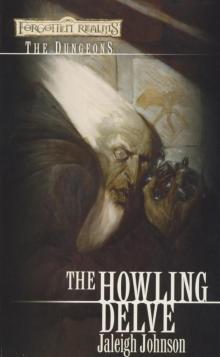 The Howling Delve d-2
The Howling Delve d-2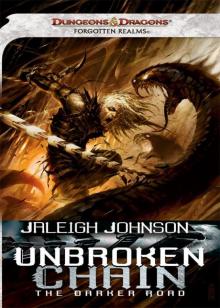 Unbroken Chain: The Darker Road (single books)
Unbroken Chain: The Darker Road (single books)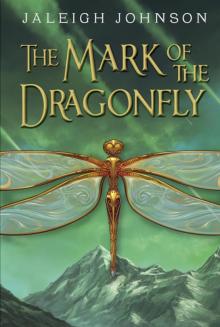 The Mark of the Dragonfly
The Mark of the Dragonfly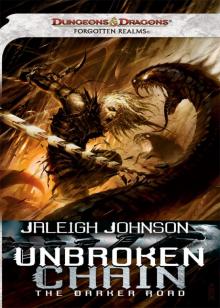 Unbroken Chain: The Darker Road
Unbroken Chain: The Darker Road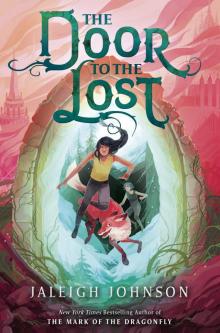 The Door to the Lost
The Door to the Lost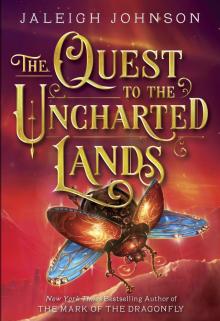 The Quest to the Uncharted Lands
The Quest to the Uncharted Lands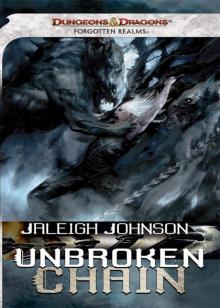 Unbroken Chain
Unbroken Chain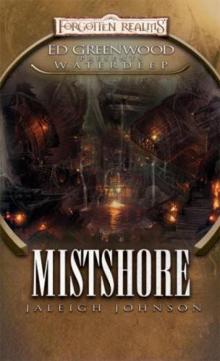 Mistshore w-2
Mistshore w-2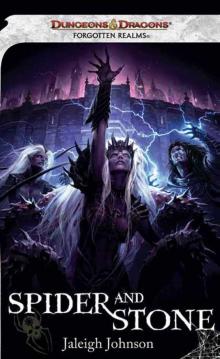 Spider and Stone
Spider and Stone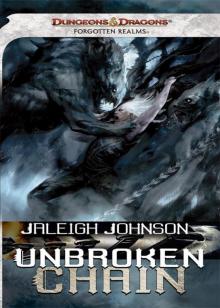 Unbroken Chain (single books)
Unbroken Chain (single books)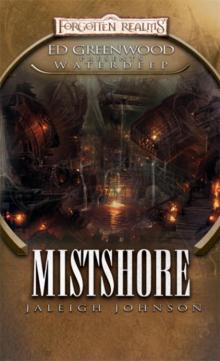 Mistshore
Mistshore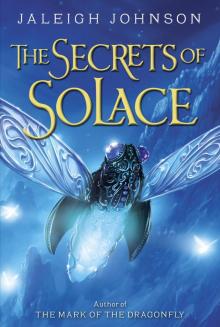 The Secrets of Solace
The Secrets of Solace